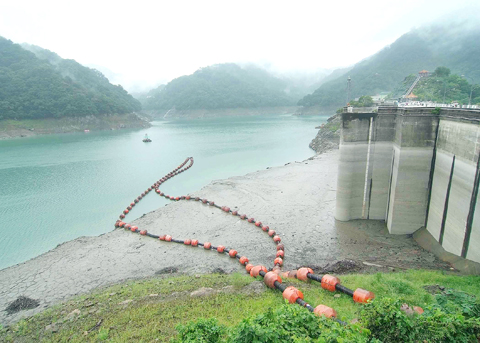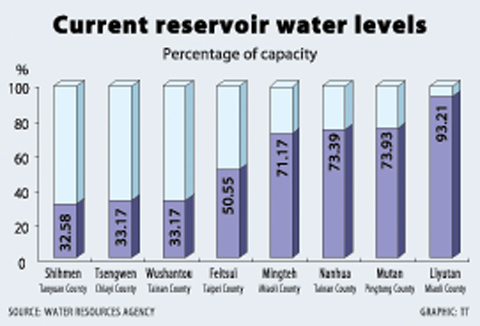Premier Liu Chao-shiuan (劉兆玄) yesterday urged the public to conserve water in the face of a looming water shortage.
“Taiwan will become a country where water shortage is a serious problem in the near future if we fail to address the situation of average water consumption per person per day, which is higher than the world average,” Liu said as he inspected Shihmen Reservoir (石門水庫) in Taoyuan County.
Liu made the remarks after being briefed on the water supply situation by Water Resources Agency (WRA) Director-General Chen Shen-hsien (陳伸賢).

PHOTO: CNA
Chen said that average water consumption per person per day dropped to 274 liters last year, from a high of 290 in 2001, but he hoped the amount could be cut to 200 as in most European countries.
Studies showed that 27 percent of household water was used to flush toilets, 21 percent was used to do laundry, 20 percent was used for showers, 15 percent was used in cooking, drinking and cleaning, and 17 percent for other purposes, Chen said.
“The water shortage facing the country is an opportunity for people to adjust their habits to minimize water consumption,” the premier said.

In related news, WRA Deputy Director Wu Yueh-si (吳約西) said on Monday that the lower than expected rainfall this year has prompted fears of water shortages because Shihmen Reservoir was only 32 percent full and the Tsengwen Reservoir (曾文水庫) in Tainan County was around 30 percent full.
Only the water levels in reservoirs supplying central Taiwan are normal, the Ministry of Economic Affairs said.
The Taiwan Water Corp (TWA) yesterday began reducing water pressure at night in Keelung, Tainan County, Tainan City and Penghu County to control the volume of water dispensed.
Wu said that the supply of industrial and household water from Shihmen Reservoir would be capped at 90 percent and 70 percent respectively compared with normal levels.
The reduction in agricultural water supplies would not affect production, he said.
Meanwhile, Vice Minister of Economic Affairs Hwang Jung-chiou (黃重球) said yesterday that in the worst-hit areas, water supplies for swimming pools and spas, the cleaning of high-rise buildings and car washes might have to be reduced or halted altogether.
Officials will meet on Tuesday to discuss water-rationing measures, Hwang said.
“We’re urging the public to conserve water,” Hwang said.
Taipei recorded 140.9mm of rainfall last month, 43 percent less than the average for the month between 1971 and 2000, the Central Weather Bureau’s Web site showed.
Meanwhile, officials in charge of Taipei’s Feitsui Reservoir said its supplies were normal and water rationing would not be imposed anytime soon.
Reservoir administration direction Lee Kung-che (李公哲) said the water level of the reservoir was 149.03m, 11.03m higher than the “shortage level” of 138m.
“Taipei City’s water supply will be stable. We will not have any water rationing measures in the next 61 days,” Lee said at the Taipei City Hall.
The reservoir’s output was 3.2 million tonnes a day, providing water to Taipei City as well as Sanchong (三重), Sindian (新店), Yonghe (永和), Jhonghe (中和), Tamshui (淡水) and Sanjhih (三芝) in Taipei County.
Lee said the reservoir’s water supply was stable for the near future because plenty of rainfall was predicted for northern Taiwan this month and next month.
To ease the burden on Shihmen Reservoir, Lee said that Feitsui would increase its supply to Banxin Water Supply Center from 200,000 tonnes a day to 400,000 tonnes.
Water levels at other major reservoirs around the country have fallen to alarmingly low levels as well, but Shihmen Reservoir has been the hardest hit, with a water level of just 224.3m on Friday evening.
The reservoir’s “shortage level” is 220m.
ADDITIONAL REPORTING BY MO YAN-CHIH AND BLOOMBERG

WAITING GAME: The US has so far only offered a ‘best rate tariff,’ which officials assume is about 15 percent, the same as Japan, a person familiar with the matter said Taiwan and the US have completed “technical consultations” regarding tariffs and a finalized rate is expected to be released soon, Executive Yuan spokeswoman Michelle Lee (李慧芝) told a news conference yesterday, as a 90-day pause on US President Donald Trump’s “reciprocal” tariffs is set to expire today. The two countries have reached a “certain degree of consensus” on issues such as tariffs, nontariff trade barriers, trade facilitation, supply chain resilience and economic security, Lee said. They also discussed opportunities for cooperation, investment and procurement, she said. A joint statement is still being negotiated and would be released once the US government has made

Authorities have detained three former Taiwan Semiconductor Manufacturing Co (TMSC, 台積電) employees on suspicion of compromising classified technology used in making 2-nanometer chips, the Taiwan High Prosecutors’ Office said yesterday. Prosecutors are holding a former TSMC engineer surnamed Chen (陳) and two recently sacked TSMC engineers, including one person surnamed Wu (吳) in detention with restricted communication, following an investigation launched on July 25, a statement said. The announcement came a day after Nikkei Asia reported on the technology theft in an exclusive story, saying TSMC had fired two workers for contravening data rules on advanced chipmaking technology. Two-nanometer wafers are the most

NEW GEAR: On top of the new Tien Kung IV air defense missiles, the military is expected to place orders for a new combat vehicle next year for delivery in 2028 Mass production of Tien Kung IV (Sky Bow IV) missiles is expected to start next year, with plans to order 122 pods, the Ministry of National Defense’s (MND) latest list of regulated military material showed. The document said that the armed forces would obtain 46 pods of the air defense missiles next year and 76 pods the year after that. The Tien Kung IV is designed to intercept cruise missiles and ballistic missiles to an altitude of 70km, compared with the 60km maximum altitude achieved by the Missile Segment Enhancement variant of PAC-3 systems. A defense source said yesterday that the number of

Taiwanese exports to the US are to be subject to a 20 percent tariff starting on Thursday next week, according to an executive order signed by US President Donald Trump yesterday. The 20 percent levy was the same as the tariffs imposed on Vietnam, Sri Lanka and Bangladesh by Trump. It was higher than the tariffs imposed on Japan, South Korea and the EU (15 percent), as well as those on the Philippines (19 percent). A Taiwan official with knowledge of the matter said it is a "phased" tariff rate, and negotiations would continue. "Once negotiations conclude, Taiwan will obtain a better